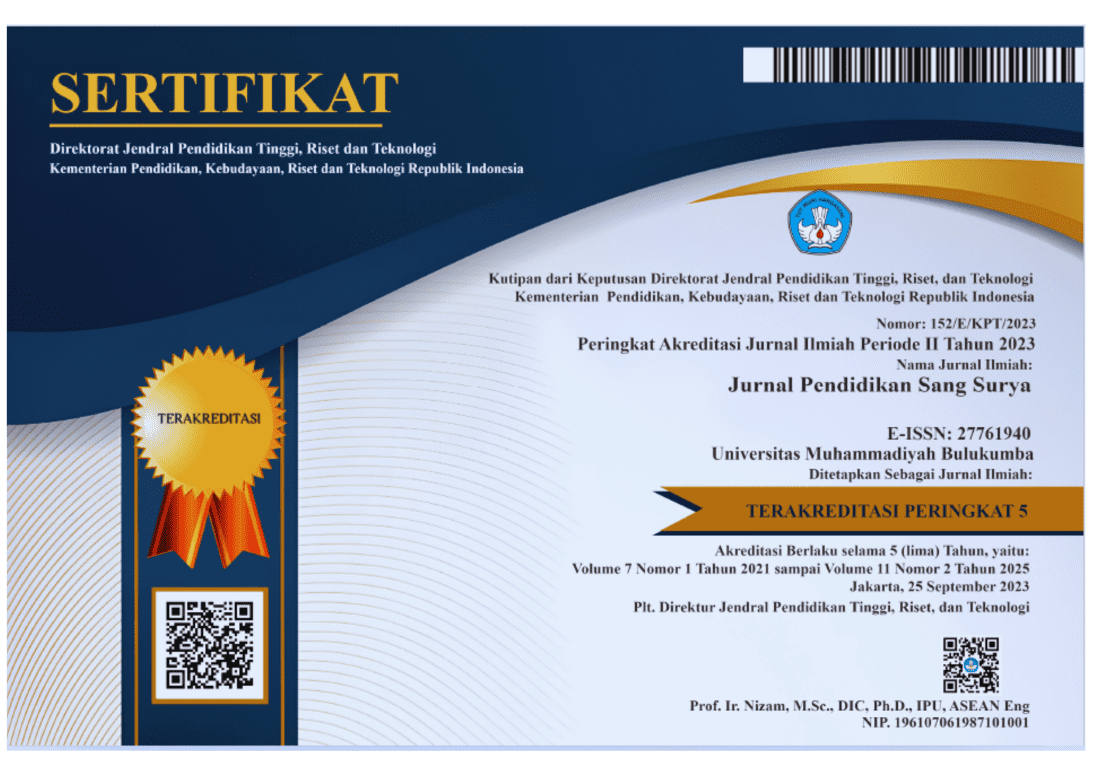TALKING STICK: A STRATEGY FOR STUDENTS’ SPEAKING PERFORMANCE
DOI:
https://doi.org/10.56959/jpss.v10i1.162Keywords:
Talking stick strategy, speaking skillAbstract
This study aims to determine the mastery of students' speaking skills by using the talking stick strategy. This study used a quantitative approach with a pre-experimental research design. The researcher selected one class as the research sample and used cluster random sampling to select the research sample. Data analysis used a t-test to compare whether there are similarities and differences after normality and homogeneity tests. The results of this study showed that using the talking stick strategy affects students' speaking ability. Data analysis found that the hypothesis test has a value of 0.00 <0.05, indicating that Ha is accepted while H0 is rejected. The talking stick strategy can affect students' speaking ability. This study interprets that talking sticks can be one of the alternative strategies to create an exciting teaching and learning process in improving students' speaking ability.
Downloads
References
Akmal. (2021). Improving The Students’ Writing Through Talking Stick Model At Grade Xi Students. Jurnal Goretanpena, 4(2), 142–146.
Al-sobhi, B. M. S., & Preece, A. S. (2018). Teaching English Speaking Skills to the Arab Students in the Saudi School in Kuala Lumpur : Problems and Solutions. International Journal of Educational and Literacy Studies 6(1), 1–11.
Arianti, R., Wardani, L., & Marta, E. (2018). The Implementation of Talking Stick Model to Improve Speaking Skills Response for 10th Grade Students of Social Science in MAN Pasir Pengaraian. Proceeding of the UR International Conference on Educational Sciences 978–979.
Creswell, J. W. (2009). Research Design 3rd Ed. Sage Publications, Inc
Dewi, R. S., Kultsum, U., & Armadi, A. (2016). Using Communicative Games in Improving Students’ Speaking Skills. English Language Teaching, 10(1), 63. https://doi.org/10.5539/elt.v10n1p63
Fajrina, D., A.Gani, S., & Hanifa, R. (2015). Students’ Learning Strategies for Developing Speaking Ability. Studies in English Language and Education, 2(1), 17–30.
Fitria, N., & Anggraini, D. (2021). The Use Of Talking Stick Method To Improve Students Reading Mastery At The Eleventh Grade Students Of SMA Negeri 1 Peukan. 9(6), 1097–1104.
Fitriani, D. A., Apriliaswati, R., & Wardah. (2015). A study on student’s English speaking problems in speaking performance. Jurnal Pendidikan Dan Pembelajaran Untan, 4(9), 1–13. https://tinyurl.com/3f5dftab
Gay, L. R., Mills, G. E., & Airasian, P. (2015). Educational Research Competencies for Analysis and Applications. Publisher: Pearson
Johnson, B., & Christensen, L. (2015). Educational Research Quantitative, Qualitative, and Mixed Approaches. SAGE Publications
Khairunnisa, Asnawi, & Yuliana. (2019). Teaching Speaking by Using Talking Stick Technique. Research in English and Education Journal, 4(3), 138–143.
Leavy, P. (2017). Research design : Quantitative, Qualitative, Mixed Methods, Art-Based, and Community-Based Participatory Research Approaches. Publisher: The Guilford Press New York
Leong, L., & Ahmadi, S. M. (2017). An Analysis of Factors Influencing Learners’ English Speaking Skill. International Journal of Research in English Education, 2(1), 34–41. https://www.sid.ir/en/Journal/ViewPaper.aspx?ID=520992
Nasution, F. K., & Harahap, N. (2016). The Difference of Student’s Achievement Using Talking Stick Learning Model and. Jurnal Pelita Pendidikan, 4(2), 47–52.
Nadhirah, Y. F., & Alfisyah. I., & Juhji. (2022) Talking Stick Method Toward Student Learning Activities In Islamic Cultural History Lessons. Jurnal Pendidikan Islam, 5(1), 151-158. https://e-journal.ikhac.ac.id/index.php/nazhruna/article/view/2044
Novitasari, A., Herayanti, L., Sukroyanti, B. A.(2018). Pengaruh Model Pembelajaran Talking Stick terhadap Keaktifan Belajar Siswa. Jurnal Penelitian dan Pengkajian Ilmu Pendidikan, 2(1), 36–40.
Prihatini, C., & Pratiwi, D. S. (2020). Talking stick learning model: a strategy in enhancing students’ English proficiency. Journal of English Education and Linguistics, 1(1), 139–142.
Sari, A. S. P., & Sembiring, R. K. B. (2019). Improving Students’ English Speaking Skill Through the Implementation of the Talking Stick Method to the Fifth Grade Students of State Primary School 028226 Binjai. Budapest International Research and Critics in Linguistics and Education (BirLE) Journal, 2(4), 507–513. https://doi.org/10.33258/birle.v2i4.552.
Ramli. (2017). The Use of Podcasts to Improve Students. Listening and Speaking SkillsforEFL Learners. Proceedings of the International Conference on English Language Teaching(Iconelt 2017), 145(Iconelt 2017), 189–194.
Suriansyah, A. (2018). Introducing Language Aspect (English) To Early Childhood Through The Combination Of Picture and picture Model, Talking stick Model, Flashcard Media, And Movement And Song Method In B1 Group At Matahariku Bilingual Kindergarten Landasan Ulin Tengah Banjarbaru, Indonesia. European Journal of Education Studies 5(7), 27. https://doi.org/10.5281/zenodo.1494188.
Swastika, P. A., Miranti, R. R., Rauuf, M., & Nur, O. (2020). The Analysis of Speaking Assessment Types in Textbook “ When English Rings a Bell Grade VII .” Jurnal Studi Guru Dan Pembelajaran, 3(2), 167–173.
Huda, F. (2018). Penerapan Model Pembelajaran Talking Stick Untuk Meningkatkan Hasil Belajar Pokok Bahasan Pancasila Sebagai Dasar Negara Republik Indonesia. Jurnal PTK Dan Pendidikan, 3(2), 45–54.
Wael, A., Asnur, M. N. A., & Ibrahim, I. (2018). Exploring students’ learning strategies in speaking performance. International Journal of Language Education, 2(1), 65–71. https://doi.org/10.26858/ijole.v2i1.5238
Downloads
Published
How to Cite
Issue
Section
License
Copyright (c) 2024 Jurnal Pendidikan Sang Surya

This work is licensed under a Creative Commons Attribution-ShareAlike 4.0 International License.
Jurnal Pendidikan Sang Surya dilisensikan di bawah Lisensi Internasional Creative Commons Attribution-NonCommercial-ShareAlike 4.0
Artikel di Jurnal Pendidikan Sang Surya adalah artikel Akses Terbuka yang diterbitkan di bawah Lisensi Creative Commons CC BY-NC-SA Lisensi ini mengizinkan penggunaan, distribusi, dan reproduksi dalam media apa pun untuk tujuan non-komersial saja, asalkan karya dan sumber aslinya dikutip dengan benar. Setiap turunan dari aslinya harus didistribusikan di bawah lisensi yang sama dengan aslinya.



